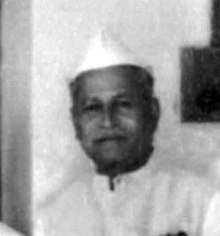Manubhai Jodhani
Manubhai Lallubhai Jodhani (28 October 1902 – 29 December 1979) was a Gujarati writer, folklorist, ornithologist, botanist and editor from Gujarat, India. He had published more than 15 books.[1]
Manubhai Jodhani | |
|---|---|
 Jodhani around 1946 | |
| Born | Manubhai Jodhani 28 October 1902 Barwala, British India |
| Died | 1979 (aged 73–74) |
| Occupation | Writer, folklorist, ornithologist, botanist, editor |
Biography
Jodhani was born on 28 October 1902 in Barwala (now in Botad district, Gujarat, India).[2][3][4] He received his primary school education at Limbdi. He became a school teacher in Barwala 1920. In 1930 he resigned to join the Indian Independence Movement.[3][4] Following Mahatma Gandhi's Salt Satyagraha, an independence activist Amrutlal Sheth decided to hold Satyagraha at Dholera. Jodhani played a leading role in Dholera Salt Satyagraha and the British Police had issued an arrest warrant for Jodhani.[5]
Later he joined the Jivanlal Amarshi Booksellers. He also worked with various magazines including Stribodh as a sub editor as well as Strijivan as an editor for 39 years.[3][4] He was a member of a committee formed by the Government of Gujarat to promote folk literature.[6][4]
He died on 29 December 1979.[4][7] His son Vasantkumar Jodhai was also a writer who published works on science and animals.[2]
Works
Jodhani has contributed considerably in the field of folk literature.[7][8][3] He was an ornithologist and botanist.[7][9] He pioneered story writings on flora and fauna of Gujarat.[10][11][4]
His works on folk literature include Sorathi Javahir (1930), Sorathi Vibhuto (1964), Randalna Geeto, Gujarati Loksahitya Mala (cowritten with Manjula Majmudar, Bachubhai Raval) and Janpad (1940, 1944, 1955; sketches).[12][4]
His short stories include Shilvati (1928) and Sundariona Shangar. Nagmati (1932) is his only novel. Khatimithi Balavato and Kumaroni Pravaskatha are works of children's literature.[2]
Padarni Vanaspati I-II (1954-55), Anganana Pankhi I-II (1955-56), Padarna Pankhi (1956) are his works on botany and ornithology.[2]
He translated Sarat Chandra Chattopadhyay's Bindur Chhele as Bindu (1939).[13]
He helped to publish Manuben Gandhi's memoir, Last Glimpses of Bapu.
Recognition
There is a road named after him in Paldi, Ahmedabad.
See also
References
- Akademi, Sahitya. Whos Who Of Indian Writers. Dalcassian Publishing Company.
- Whos Who Of Indian Writers. New Delhi: Sahitya Akademi. 1961. p. 143.
- "મનુભાઈ જોધાણી" (in Gujarati). Gujarati Sahitya Parishad. Retrieved 2020-04-28.
- Desai, Ratilal Deepchand (2003). "7. ધિંગા લોકસાહિત્યકાર શ્રી મનુભાઈ જોધાણી". In Desai, Nitin R. (ed.). Amruta-Sameepe (in Gujarati). Ahmedabad: Gurjar Granthratna Karyalaya. pp. 373–374.
- Madhad, Raghavji (2020-03-25). "આંખો આંસુથી વહેવા લાગી હતી: સૌરાષ્ટ્રના સ્વાતંત્ર્ય સૈનિકો અને લડતો". Sandesh. Retrieved 2020-04-28.
- The Indian P.E.N. P.E.N. All-India Centre. 1968.
- Gujarat. Ahmedabad: Smt Hiralaxmi Navanitbhai Shah Dhanya Gurjari Kendra, Gujarat Vishvakosh Trust. 2007. pp. 235, 426.
- "Contribution of Gujarat to the Field of Folklore". Indian Folklore Research Journal. National Folklore Support Centre (2–5): 77. 2002.
- Daniel, J. C.; Ali, Sálim; Ugra, Gayatri (2003). Petronia: Fifty Years of Post-independence Ornithology in India : a Centenary Dedication to Dr. Salim Ali, 1896-1996. Bombay Natural History Society. p. 104. ISBN 978-0-19-566653-3.
- JAMUNA, K. A. (2017-06-01). Children's Literature in Indian Languages. Publications Division Ministry of Information & Broadcasting. ISBN 978-81-230-2456-1.
- Jamunā, Ke E.; Division, India Ministry of Information and Broadcasting Publications (1982). Children's literature in Indian languages. Publications Division, Ministry of Information and Broadcasting, Govt. of India.
- Magara, Naresh (January–February 2019). "ગુજરાતી લોકસાહિત્યક્ષેત્રે થયેલ સંશોધન – સંપાદનની કામગીરીની રૂપરેખા". Sahitya Setu (in Gujarati). Tanvi Shukla. 9 (49). ISSN 2249-2372.CS1 maint: date format (link)
- Śaratcandra o Bhāratīẏa sāhitya (in Bengali). Nikhila Bhārata Baṅga Sāhitya Sammelana, Dillī Sākhā. 1976. p. 1957.